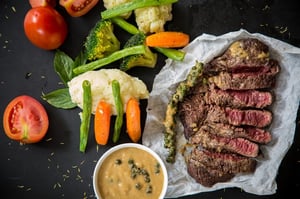There is a lot of misinformation in the world of nutrition. From well-meaning advice passed down...
The Importance of Protein in Aging
As we age, it becomes even more critical to prioritize a diet rich in key nutrients for maintaining health and increasing quality of life. While there are a variety of supplements available, the best way to receive the nutrition you require is through real food and complete meals that include the nutrients and vitamins that work to improve your health.
Protein is one of these essential nutrients. It helps us maintain muscle mass and keep our bodies active. Not only does aging decrease the body's energy and immunity, but it also wears down tissue. Therefore, it's important to eat a diet rich in protein since it aids in the repair of damaged cells as well as the growth of new ones.
What Is Protein?
Protein is a molecule made up of amino acids and one of three primary "macronutrients" (the other two being carbohydrates and fat). The term "macro" in the definition relates to their significance to human life because they collectively offer calories and, therefore, energy. While micronutrients like iron and vitamin C are vital for our health and "feeling well," we wouldn't be able to exist for long without macronutrients.
Protein is unique in that it provides energy and helps build and maintain muscle mass. Protein is essential for older adults to maintain and strengthen the muscles required for mobility and activity.
Role of Protein In Aging
Protein is essential for older adults and must be included in everyone's healthy diet for the following reasons:
 Protein is the body's building block and significantly contributes to the health of new cells, skin, tendons, and ligaments
Protein is the body's building block and significantly contributes to the health of new cells, skin, tendons, and ligaments- Protein repairs tissue and cells that have been damaged or worn out
- Protein gives you energy
- Proteins help to lower blood sugar and cholesterol levels
- A high-protein diet helps maintain bone health and lowers the risk of osteoporosis
- Protein content in meals lowers the risk of stroke
- Protein helps to develop muscle mass
- It's a popular nutrient for weight loss for its appetite-suppressing and fullness-promoting qualities
How Much Protein Do Older Adults Need?
According to Harvard Health, "The Recommended Dietary Allowance (RDA) for protein is a modest 0.8 grams of protein per kilogram of body weight." Note that RDA is how much you need to meet basic nutritional requirements, or the minimum you need to avoid getting sick — not the daily recommended amount. One way to calculate how much protein you should be consuming is to multiply your weight (in pounds) by 0.36. Here's a helpful calculator you can use too!
Best Sources of Protein
 Protein is commonly found in animal sources such as fish, chicken, and dairy. You can also find high protein content in plant sources, such as legumes and beans. However, plant sources frequently lack one or more essential amino acids. Thus, eating a variety of protein-rich foods, such as beans and rice, grains, and legumes, in addition to animal sources, is the best option. You shouldn't rely just on one or two protein sources for your daily protein intake. Eat a mix of protein-rich animal and plant foods.
Protein is commonly found in animal sources such as fish, chicken, and dairy. You can also find high protein content in plant sources, such as legumes and beans. However, plant sources frequently lack one or more essential amino acids. Thus, eating a variety of protein-rich foods, such as beans and rice, grains, and legumes, in addition to animal sources, is the best option. You shouldn't rely just on one or two protein sources for your daily protein intake. Eat a mix of protein-rich animal and plant foods.
Before relying on supplements, speak with your doctor about how to get enough vitamins and nutrients from foods in your diet. However, if you are unable to do so, follow your doctor's advice regarding meal replacements, supplements, or protein shakes.






